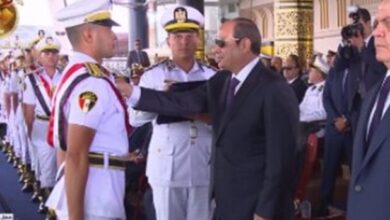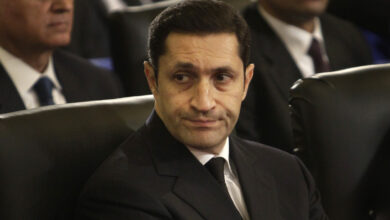Deposed President Hosni Mubarak made his first public appearance since 10 February on Wednesday morning, this time in a court cage, as a defendant in a much-anticipated trial on charges of corruption and killing protesters during the uprising that led to his downfall.
A fair trial for the former president is widely perceived as crucial for the completion of the Egyptian revolution’s demands.
Mubarak’s case was postponed until 15 August. Until then he will be transferred to the International Medical Center on the Cairo-Ismailia Road, where he will be escorted by his personal medical team. The former president reportedly suffers from depression, fatigue and lack of appetite.
Mubarak was flown from a Sharm el-Sheikh hospital to the Almaza military airport and then taken by helicopter to the Police Academy, where the hearing was held in a specially constructed courtroom. Mubarak appeared in the dock in the white suit of an accused prisoner, with his hair seemingly dyed jet black, lying on a hospital bed.
His sons, Gamal and Alaa, showed up in court after they were transferred from the Tora prison, where they have been held since mid-April. The older son, Alaa, carried a Quran and fidgeted throughout the hearing, while his younger brother Gamal seemed composed. Former Interior Minister Habib al-Adly, who is being tried with the former president, showed up as well – in a blue convict’s jumpsuit – alongside his six aides, who also face charges. Their cases resume tomorrow.
The judge, Ahmed Refaat, has a track record of handling cases that pressured the former president's regime politically. In one case, he ordered the release of 16 members of the Muslim Brotherhood – which was banned under Mubarak – considered an act that challenged the regime.
Refaat also refrained from interrogating two judges after they were referred to disciplinary boards. The judges, Mahmoud Mekky and Hesham el-Bastawisi, then vice president of the Court of Cassation, wrote reports in 2005 that accused the government of holding fraudulent elections.
At the hearing, the prosecutor listed the charges against Mubarak, his sons, Adly and his aides. The charges against Mubarak include premeditated conspiracy between Mubarak and Adly to kill protesters, a charge that could carry the death penalty.
“The intention to kill a number of protesters is there. Those protesters took part in a peaceful uprising in different governorates against the declining social, political, economic and security conditions. They demanded reforms, on top of which is to put an end to Mubarak’s rule and that of his regime,” the prosecutor said.
Associated crimes include the fact that policemen killed protesters using live shots from their positions and ran over them with their trucks, the prosecutor said.
“The intention was to kill a number of protesters so that the others disperse and abandon their demands, so that [Mubarak] holds on to his position as president."
The prosecutor also charged Mubarak with profiteering by acquiring for himself and his sons five villas worth nearly LE40 million through formal sales contracts provided by Hussein Salem, who in return acquired 2 million square meters of land in the South Sinai resort town of Sharm el-Sheikh.
Mubarak was also accused of striking the gas exports deal to Israel in collaboration with former Petroleum Minister Sameh Fahmi, to whom he specified the company to which the sales should be made – namely East Mediterranean Gas, who has Salem as a representative. The act violates legal procedures for companies’ selection, while gas has been sold at below-market rates, amounting to a loss of nearly US$715,000.
Gamal and Alaa face corruption charges but are not accused of conspiring to kill protesters.
When faced with the charges, all three Mubaraks repeated the same sentence, “I categorically deny all the charges against me.” Gamal repeated the judge’s questions to his father, who responded with a clear voice.
As the court kicked off, Judge Ahmed Refaat, head of the Cairo Criminal Court, asked lawyers to identify themselves and to submit their written demands. Lawyers representing the defendants insisted to make their demands orally as part of the court’s obligation to be public.
Farid al-Deeb, who represents Mubarak, his sons, and Adly, demanded a separation between Mubarak’s case and Adly's. On 25 July, a court ordered that Adly’s case be added to Mubarak's.
Deeb also requested the printed content of a flash memory card that includes the case’s details, the transcription of Gamal Mubarak’s interrogations on 12 April, the hearing of 1761 witnesses registered in the case, as well as others who haven’t been registered, such as Field Marshal Hussein Tantawi, head of the Supreme Council of the Armed Forces and six former governors of South Sinai.
Other defendants’ lawyers demanded further investigations by checking sites in downtown Cairo, such as The American University in Cairo, the Interior Ministry, the Ramses Hilton Hotel and other locations. They also demanded to hear the testimonies of different officers at the former State Security Investigations apparatus, the Cairo Security Directorate and police stations in Cairo and Giza.
The lawyer of defendant Hassan Abdel Rahman, former head of the State Security Investigations department, asked for the case to be postponed for at least a month. He complained about the fact that the investigations conducted are not enough.
Mubarak and Adly, while being accused of murder, also face civil claims in conjunction with the criminal charges.
The claims would grant compensation to the victims of their alleged crimes. A large number of lawyers representing martyrs’ families were also present in the trial to push for their claims.
“We demand the strictest verdict against the accused so that they become a historic lesson,” said one of the lawyers representing the families of the martyrs.
Another lawyer demanded that the cases of other policemen accused of killing protesters be included in Mubarak and Adly’s cases and that Mubarak be placed in Tora prison.
Other lawyers demanded that former Shura Council speaker Safwat al-Sherif, former ruling National Democratic Party Leader Ahmed Ezz, and former Presidential Chief of Staff Zakariya Azmy be included in the case as defendants. They also demanded the summoning of chairs of the telecommunication providers to ask them about orders to suspend services during the early days of the uprising.
Both the lawyers of the defendants and the victims' families demanded the summoning of Tantawi and former Intelligence Chief Omar Suleiman. The summoning of Tantawy raises questions around the possible implication of SCAF in the case.




